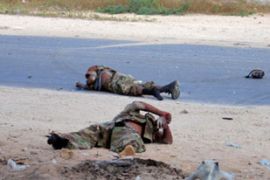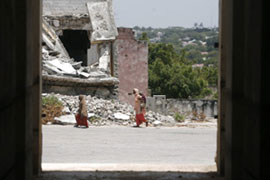Mogadishu battles enter second day
Mortar shell strikes residents after Ethiopian troops launch air attack.

Published On 30 Mar 2007
Faisal Jamah, another resident, speaking after Friday’s mortar attack, said: “There are a lot of wounded, but there is no way to take them to the hospitals due to the fighting on the roads.”
Helicopter attacks
| Your Views |
|
“I think Ethiopia’s role in Somalia now has to be fair and unbiased” Justice, Shenzhen, China |
Ban Ki-Moon, the UN secretary-general, has expressed concern over the use of helicopters to attack positions inside the city.
Ban is “particularly concerned about the use of air strikes and the introduction of tanks and heavy artillery into densely populated parts of the city, further increasing the security threat to large numbers of civilians,” Farhan Haq, a UN associate spokesman, said in New York.
Ban called for an immediate halt to the fighting.
“The secretary general emphasises once again that sustainable peace in Somalia can only be attained through an inclusive dialogue leading to a political solution and national reconciliation,” Haq said.
Dozens of people were killed on Thursday, at least 11 of them civilians, and many more were wounded.
Dragged through the streets
Seven Ethiopian soldiers were said to have been killed, with witnesses in the southern district of Shirkole reporting the bodies of Ethiopian troops were dragged through the streets.
Loudspeakers transmitted calls for residents to come out and fight the Ethiopian troops.
The scenes echoed violence last week, when crowds burned the bodies of two dead Somali soldiers.
 |
| More than 10,000 people have fled fighting in the city in the past week [AFP] |
The fighting on Thursday brought an end to a ceasefire agreement in place since the weekend.
But Mohamed Mohamud Husein, a spokesman for the Somali president, said the fighting marked the beginning of a three-day push to restore order in Mogadishu, as Ethiopian troops, who helped the Somali government oust Islamic Courts fighters last year, withdraw from the capital.
In Ethiopia, Meles Zenawi, Ethiopia’s prime minister, said that more than two-thirds of his forces had returned home, but gave no figures.
In a speech to his country’s parliament, he said “extremists” in Somalia were no longer a “clear and present danger” to Ethiopia.
“After breaking the backbone of extremist forces, our defence forces have started to withdraw,” Zenawi said, adding that his government would continue to train Somali security forces.
But continued heavy fighting in Mogadishu is causing many residents to flee.
The UN’s refugee agency estimates 57,000 people have fled the Somali capital since the beginning of February, including more than 10,000 people who left in the past week.
Source: News Agencies